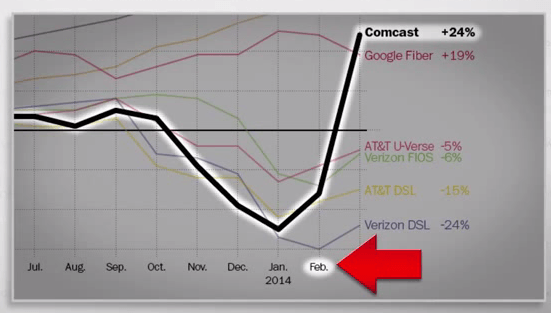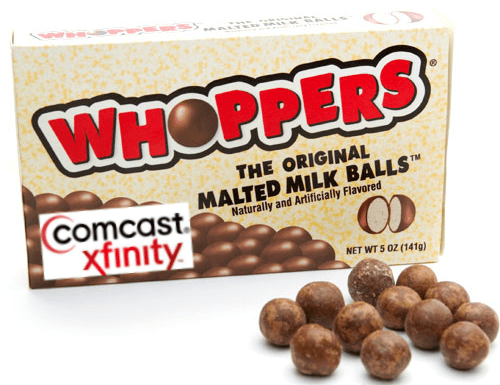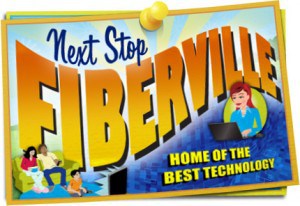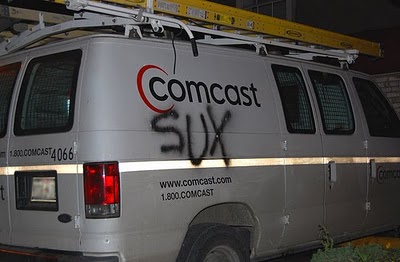
Oliver points out President Obama is very close to Comcast’s top lobbyist (and Democratic fundraiser) David Cohen.
John Oliver, host of HBO’s “Last Week Tonight,” took nearly 15 minutes out of his show last night to present a detailed and unusually apt explanation of why Net Neutrality should matter to Americans.
Using a timely chart depicting Comcast’s Al Capone-like Internet protection racket, Oliver showed how Netflix performance rapidly deteriorated for Comcast customers until Netflix agreed to pay Comcast for a direct connection in February. Within days, performance rebounded to new highs.
In essence, Oliver explains, Net Neutrality is about the controversy of allowing Internet toll lanes.
Oliver shows an industry mouthpiece defending the concept as a “fast lane for everybody and a hyper speed lane for others,” to which Oliver responds, “Bullsh*t!”
“If we let cable companies offer two speeds of service, they won’t be [Jamaican sprinter] Usain Bolt and Usain Bolt on a motor bike,” Oliver warns. “They’ll be Usain Bolt and Usain Bolted to an anchor.”
Oliver added he was concerned most Americans were not paying attention to the issue, proclaiming it “boring.”
“And that’s the problem. The cable companies have figured out the great truth of America: if you want to do something evil, put it inside something boring,” he said. “Advocates should not be talking about protecting Net Neutrality. They shouldn’t even use that phrase. They should call it preventing cable company fuc*ery. Because that is what it is.”

Comcast’s Internet protection racket. Netflix watched customer streaming performance degrade on Comcast’s network until it signed a paid peering agreement with the cable company in February.
Oliver’s prescription for change is somewhat more dubious, however. He wants Internet trolls to overwhelm the FCC’s Net Neutrality comment mailbox:
I would like to address the Internet commenters out there directly. Good evening monsters, this may be the moment you spent your whole lives training for.
You’ve been out there ferociously commenting on dance videos of adorable 3-years-olds, saying things like, “Every child could dance like this little loser after one week of practice.” Or you’d be polluting Frozen’s Let It Go with comments like, “Ice Castle would give her hypothermia and she dead in an hour.” Or, and I know you’ve done this one commenting on this show: “F*ck this a**hole anchor […] ur just friends with terrorists xD.”
This is the moment you were made for commenters. Like Ralph Macchio, you’ve been honing your skills waxing cars and painting fences, well guess what? Now it’s time to do some f*king karate.
For once in your life we need you to channel that anger.
[flv]http://www.phillipdampier.com/video/HBO Last Week Tonight with John Oliver Net Neutrality 6-1-14.flv[/flv]
John Oliver’s Last Week Tonight addresses Net Neutrality to viewers who probably don’t understand a thing about it. Warning: Strong language. (13:17)


 Subscribe
Subscribe Comcast is using an offline console game that misrepresents the speed and performance of its Internet service in its latest advertising.
Comcast is using an offline console game that misrepresents the speed and performance of its Internet service in its latest advertising. The town of Hollis, N.H., population 7.600, is the first community in New Hampshire to receive gigabit broadband, courtesy of the local telephone company.
The town of Hollis, N.H., population 7.600, is the first community in New Hampshire to receive gigabit broadband, courtesy of the local telephone company.

 de Blasio also announced his intention to explore converting 10,000 of the city’s barely-used pay phones into Wi-Fi hotspots.
de Blasio also announced his intention to explore converting 10,000 of the city’s barely-used pay phones into Wi-Fi hotspots.
